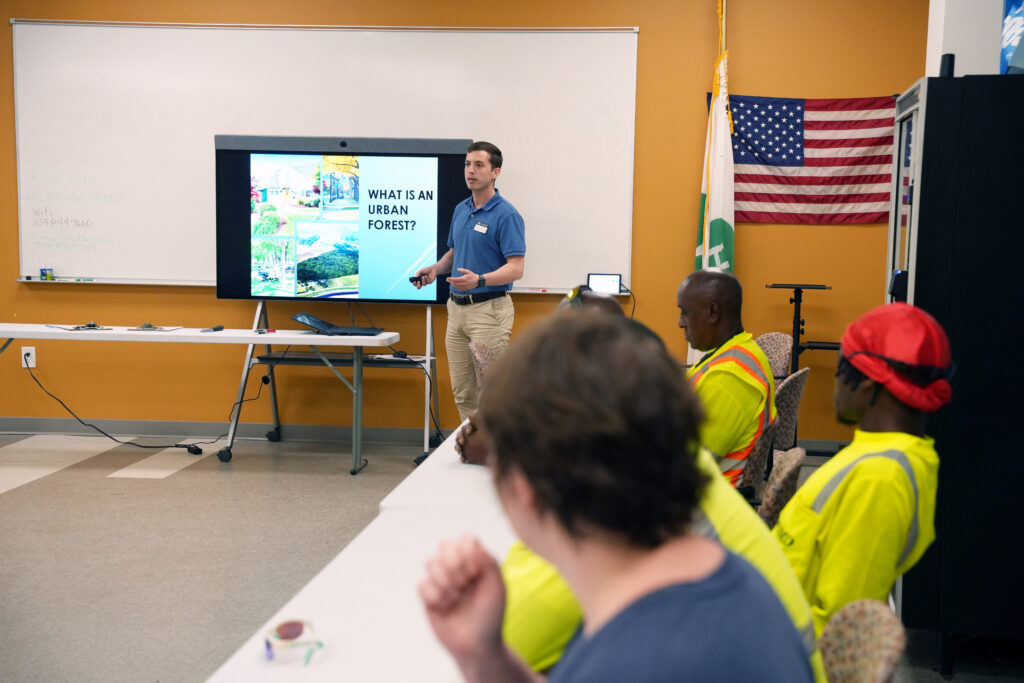
Green Up Alabama project co-lead, Georgios Arseniou, is shown discussing urban forests during a recent Alabama Extension program held in Montgomery, Alabama.
Alabama’s small and rural communities are becoming increasingly more vulnerable to a range of issues as their often-sparse tree canopies age and decline.
Lacking sufficient resources to establish and maintain their urban forests, these communities are at greater risk from storm damage, heat and environmental degradation.
Funded through a $1.5 million grant awarded by the U.S. Forest Service Urban and Community Forestry Program, a new collaboration between Auburn University and the Alabama Cooperative Extension System (ACES) will engage local partners to address the environmental, social and economic challenges at the root of the problem.
A three-prong issue
“Green Up Alabama is a strategic response to these multiple intersecting challenges largely affecting urban communities in the state, especially those that have been historically underserved and environmentally disadvantaged,” said Georgios Arseniou, an assistant professor in the College of Forestry, Wildlife and Environment (CFWE) and Alabama Extension specialist who co-leads the project team.
Contributing to Alabama’s Forest Action Plan and the Ten-Year Urban and Community Forestry Action Plan (2016–2026), the Green Up Alabama project will deliver a wide spectrum of benefits that collectively support a more just, resilient and prosperous future for urban communities.
One of the central problems it aims to tackle is the lack of equitable urban tree canopy, which disproportionately affects lower-income neighborhoods.
“These communities are often subject to urban heat islands, poor air quality, limited shade and a general lack of access to natural spaces, all of which negatively impact physical and mental health,” said Arseniou.

Georgios Arseniou is shown demonstrating proper tree pruning techniques for participants during a recent Alabama Extension program held in Montgomery, Alabama.
Due in part to a shortage of trained professionals and a lack of reliable urban forest inventory data, many municipalities across Alabama also face limited capacity and outdated practices in managing urban forests.
Further, though well-intentioned, tree-planting efforts often fail or fall short without fully considering the social barriers that may exist within a community.
Requiring a land-grant solution
Distinguished by its multidimensional, interdisciplinary approach, Green Up Alabama will blend community engagement with applied research, education and workforce development to address the issues impacting the long-term success of urban greening initiatives—a land-grant model the team hopes can be replicated across the state, region and nation.
“What makes the project truly unique is the integration of community-driven greening efforts with educational programming, cutting-edge technology and academic research over a sustained five-year period,” said the project’s co-leader Beau Brodbeck, ACES’ assistant director of field operations. “We anticipate Green Up Alabama will create lasting transformations in how urban forestry is practiced, perceived and sustained across the state.”
One key objective is the successful planting and long-term maintenance of more than 350 trees in disadvantaged urban areas, providing much-needed environmental relief and beautification.
But the project’s ambitions go far beyond tree counts.
It aims to establish a pipeline of skilled, local arboriculture professionals by training municipal workers and emerging green-sector employees, enhancing their technical expertise and employability. The initiative also seeks to engage and inspire young people, offering them leadership roles and hands-on experience in environmental stewardship.
On the research side, the project will produce high-quality urban forest inventory datasets and actionable insights that municipalities can use to guide future planning. Importantly, the research component will further explore the social and cultural factors that affect tree adoption, survival and public acceptance, enabling future urban greening efforts to be more culturally attuned.
A model for all
“At the end of the five years, the goal is to have created a replicable, community-rooted model for urban forestry that can be scaled across other regions of Alabama and beyond,” said Brodbeck.
This novel approach combines technical innovation, human-centered design and educational investment, giving the project the unique capacity to generate measurable impact at multiple levels.
“By aligning ecological restoration with economic empowerment and social inclusion, Green Up Alabama will generate enduring value for communities and ecosystems alike,” said Janaki Alavalapati, the Emmett F. Thompson Dean of the CFWE.
To learn more about the project, visit Green Up Alabama: Growing Greener, Stronger Communities – Alabama Cooperative Extension System.
(Written by Jamie Anderson)









